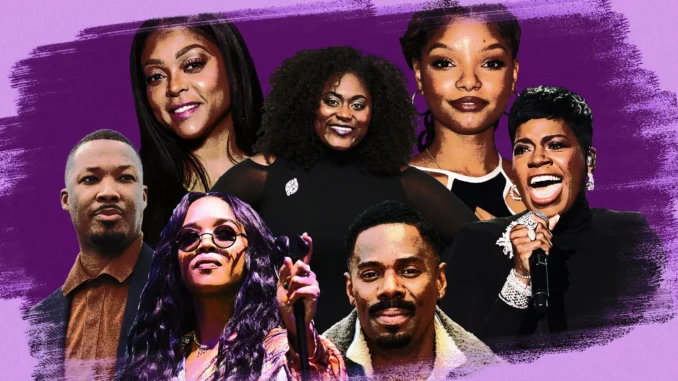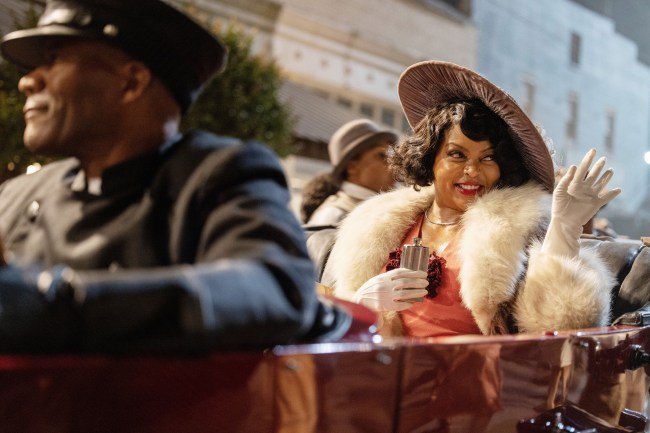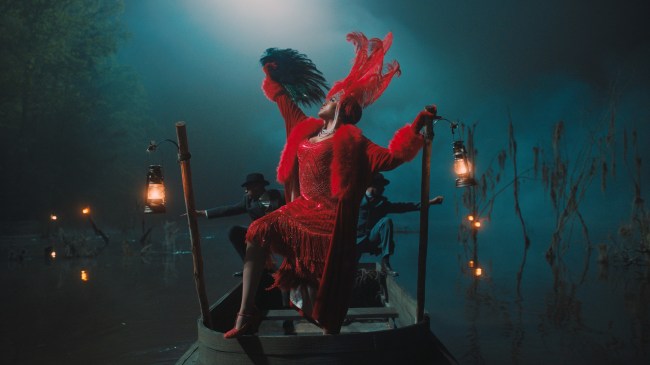
“Welcome to Hollywood,” Taraji P. Henson said when asked why “The Color Purple” director Blitz Bazawule had to fight to cast her as Shug Avery in the Warner Bros. musical.
The Oscar-nominated actress’ recent viral comments about pay inequity, starting with a Gayle King interview on SiriusXM in which Henson broke down in tears, and later revealing that she and her “Color Purple” cast and crew were deprived of proper security detail and crafts services during filming, have overshadowed the actual work. Make no mistake: Henson is the real deal as the sexuality-oozing blues songstress Shug Avery in Bazawule’s Alice Walker adaptation, itself a film version of the beloved Broadway musical. Henson holds her own song-and-dance-wise alongside Fantasia Barrino, who stars as Celie, but had to reactivate a musicality in herself that she hadn’t tapped into since her early days as a background actor and student of drama at Howard University.
The Christmas box office smash — one of the highest holiday openings ever — just notched a SAG ensemble nomination, along with Danielle Brooks for her rousing supporting turn as Sofia. Henson’s powerhouse turn is included in that nominated ensemble. But her press tour has emerged as more of a barnstorming around disparities in Hollywood, and its continued sidelining of Black talent. It’s nothing new from the outspoken and passionate Henson, but people in power, just maybe, this time are closely listening. (Henson has been clear, however, that producer Oprah Winfrey was a champion who made calls to make changes on set.)
In a wide-ranging conversation, Henson discusses why she spoke out this time (again), how the new film recaptures the novel’s queer legacy, and how she still struggles in her career despite quantifiable box office clout and a stack of awards nominations on TV (“Empire”) and film (“The Curious Case of Benjamin Button”).
IndieWire: This version, compared to Steven Spielberg’s 1985 film where Margaret Avery played Shug, appreciates the queer dynamic flowing between Celie and Shug. Why was that important this time around? It was a rockier road to even get what’s barely on the screen of their queer relationship in the first movie.
Henson: We have advanced as a society where we’re more open to who people love, and it’s really none of our business. That’s how I’ve always lived my life. Live and let live. As long as you’re happy, no one’s putting their hands on each other. Do you, be happy. Whatever that looks like, I don’t care. So I was happy to deal with it because for me, what it was was two women teaching each other about the unconditional tenderness of unconditional love. That’s what I saw. Yes, of course, it was sexual, sensuality involved, but the sensuality comes out of being seen, someone really seeing into your soul and as loud and boisterous and as big of a personality as Shug has. No one sees her. They see her, and they sexualize her. They idolize how to fantasize about her, but no one really sees her. She’s an entertainer. She’s there to please the people, but who pours back into her? That’s how I dealt with the relationship with Shug and Celie. It was two people, two human beings. Let’s take sex out of it, right? Sure, this happened to be women, but these were two human beings that actually saw into each other’s soul for the first time. No other person has ever seen Celie. She hadn’t had this kind of experience with another human being since her sister was driven away from her life.

Spielberg later said he felt like the wrong director to tell this story, especially the queer aspects. Quincy Jones received letters from people threatening to boycott the movie over Shug and Celie’s relationship, which is mostly platonic in the 1985 film.
Henson: It’s in the book. She held nothing back in the book.
You and Blitz Bazawule had to advocate for the studio to cast you as Shug. So did Danielle Brooks, even though she literally played Sofia in the stage version.
Henson: Welcome to Hollywood. That’s happened to me several times in my career where I was the director’s choice, but not the studio’s choice. I’m so used to that.
What did you have to do to get cast, or was it Blitz fighting for you?
Henson: Fighting! And the one thing is that I had to prove I could sing. I understood that.
But you sang in “Hustle and Flow.”
Henson: That’s not like this. That’s a hook to a rap song. That’s not singing. You could do that. You lay it down once and they loop it. Shug sings gospel, jazz, and blues. That’s three genres. I had to work really, really hard. I can sing, but I left singing behind when I chose to come west and not go to New York and pursue singing because I was a young mother already. And the music world just seemed dark. It wasn’t unionized. I’m a mother now. I need insurance. There were other things to consider. I wasn’t just some young 20-something-year-old out in the world trying to pursue my dreams with no real responsibility. I was a full-blown mother. So I had to make the choice, and I decided to go for acting. Blitz did his due diligence. I really was questioning Blitz. “Why me, Blitz?” He’s like, “Because you are Shug.”
I’m sure it must have been humbling to audition at this stage in your career.
Henson: I had to check my ego. But one thing: If you ever want to piss me off, second-guess me, doubt me. I walked into that audition, I kicked that door down. I was Shug, fully realized. I had a dress on that I could move. It was very sexy and reminiscent of the period. I did my makeup, my hair. I had a full fur stole on. Everybody in the room was like, “Whoa.” When I walked out, I was like, I bet y’all don’t ever second-guess me again. Within 20 minutes, I had the job. Sure enough, Ms. Oprah called, and she was like, “Shug Avery’s coming to town.” And she was like, “Taraji, it was unanimous.”
What was your relationship with Fantasia Barrino like between takes?
Henson: We are friends for life. That woman can’t ever get rid of me, and I’ll never get rid of her. We’re friends for life. I was scared shitless having to sing with her. Not only singing myself, but I had a duet with this powerhouse voice, Fantasia, that I’ve watched her entire career. I voted until my thumbs were numb when she was on “American Idol.” We held each other’s hands through the whole process and lifted each other up. I know what it is to lead a movie, and I know what it takes to support a leading role. Celie is a difficult character to portray. It’s very dark. The subject matter is horrible. And to have to live in that space for 18, 20 hours a day is tough. So I would just watch her moves, and those moments where I felt like she didn’t have to stay in [it], I would go grab her, take her outside, make her laugh, take her mind off of Celie’s world, move the energy around. She was carrying her cross and Celie’s cross. I don’t think people understand the weight of taking on these characters when you have your own weight in your life to carry as well.

And to have to be this other person on set for so long while also being yourself the rest of the time.
Henson: That’s why I trained myself early on. I had to. I was a mother, and when I would come, he doesn’t know about Hollywood and all these crazy characters I’m playing. All he knows is “What’s for dinner? I have homework. What am I wearing to school tomorrow?” I had to look at myself and my body as an instrument like a trumpet player. They know those notes secondhand. The notes for me are on the page, the words and the emotions, so I should be able to touch any part of my body — metaphorically speaking! — to get to those emotions. People gotta home. We can’t do this all day.
It works for my benefit, to be quite honest. I literally can be in the middle of a scene, and they yell cut, I could be bawling my eyes out, and I would go, “Anyway, girls, like I was saying…” Then they’ll go “action,” and I’ll be right back in.
You said that on “The Color Purple,” the cast received rental cars but not drivers. You helped get proper transportation and security for everybody on set.
Henson: I guess they expected me to drive in Atlanta, where they’re robbing and stealing left and right. I’m like, this could be an insurance liability. I can’t just drive myself around like that. It’s easier to do in LA because it’s a lifestyle here. They’re used to seeing us here. You start going to southern states and, things like that, it could get really dangerous. You don’t know. People think they know you, especially the character that I portray. That’s what I was explaining to them. I was like, people have this affinity for Cookie [in “Empire”]. They think they know Cookie. And when they see me? I’ve been hit. I’ve been hugged when unwarranted. People have invaded my personal space because they think they know me because of this character. And I said, “That’s dangerous.” What do I look like, traipsing around Georgia trying to find a location by myself in weird hours of the night or in the morning at WeWork.
What happened next?
Henson: My team, we were so frustrated. I was like, “I don’t understand the thinking here.” And then they came back to my team and were like, “If we do it for you, we got to do it for everybody.” Well, you should do it for everybody. Do it. Why wouldn’t you? Don’t you want to make sure your actors get to set safely? I don’t live in Atlanta. I don’t know where I’m going. Turn the wrong road, you might not come back home. I hate to say that, but that’s the world we live in. I’m not a gaudy person. I don’t live out beyond my means. I still go to the grocery store myself. I still cook. I don’t have a chef. I don’t have a chauffeur. I drive myself to the grocery store and I buy my own groceries. I can’t even afford an assistant right now to go do that. And I would love to have an assistant help me with other stuff, but I still like buying my own groceries. If you bring me the wrong lemon and it’s dried up… I want to pick my produce!
I still like to live some normalcy in my life because of the characters I play. If I remove myself from society so much, then how can I be in touch with these characters? My point is that I’m not some woman who asks for the moon. The whole point is we want to get this movie done in a timely manner with no hiccups and no issues. So wouldn’t that behoove you to have your talent show up safe and unscathed and in one piece?

To some producers that’s a revelatory idea.
Henson: When you’re crunching numbers, I guess people get nervous. That just didn’t make sense to me, and I know this is what you do for other productions. It seems like every time it’s a predominantly Black production, all of a sudden there’s no money, and I’ve been hearing it my entire career.
I’ve said all this before. I wrote a book, for God’s sakes, in 2016. I talked about it on “The View.” I’ve talked about it on national television. I’m not the only one. Look up any woman of color in this industry. She’s said the same thing. I’m tired of us having the same conversation. For whatever reason, everybody wanted to listen this time. But it’s not like I’m saying anything new.
How do you put your words to action going forward, in terms of both your own career and continuing to open doors for others?
Henson: I could have taken a bullet for speaking up. I could’ve been shunned, shut out. I was nervous. But what I do know is the only way you make change is if you speak up, and that’s what I’m here to do, because why else am I doing this? If I’m not making it better for those coming up behind me, then I’m a selfish person. What am I doing it for? I’m standing on the shoulders of my ancestors who took bullets for me to be here. You understand? So what makes me better than my ancestors?
You’ve spoken many times about how you were paid only $150,000 for “Benjamin Button” as the third-billed actress in the film, compared to the half a million you were expecting compared to your co-stars.
Henson: The only person in this industry who’s treated me like I felt I needed to be treated was Tyler Perry. The man gave me my first quote. When I didn’t have a quote, and when they did me how they did me on “Benjamin,” I had no power. I saw the bigger picture later. Years later, my quote quadrupled. Tyler Perry had another movie for me to star in, “Acrimony.” When I’m fighting, I’m fighting just to get what I got the last time. I’m not even fighting for a raise. Each and every time I go into negotiations, and it’s like, you know what I got paid the last time. Why are you acting like I’m going to take less? That’s what I mean. It’s insulting and it hurts my freaking feelings. When Tyler Perry came in, he said I know you’re not worth $500,000 now, but what is your quote now? He paid it right up. He sent his private jet. He made sure I had a driver and security the entire time.
The Golden Globes nominated “The Color Purple” for Fantasia and Danielle, but not in the Best Musical or Comedy category, which exists to make sure a movie like this gets in. Were you surprised?
Henson: I don’t wrap myself up into the awards. Honestly, none of it really makes sense to me. I tried to play the game. If I wanted to compete, I would’ve been an athlete. Art, to me, there’s no competition.
SOURCE: IndieWire

